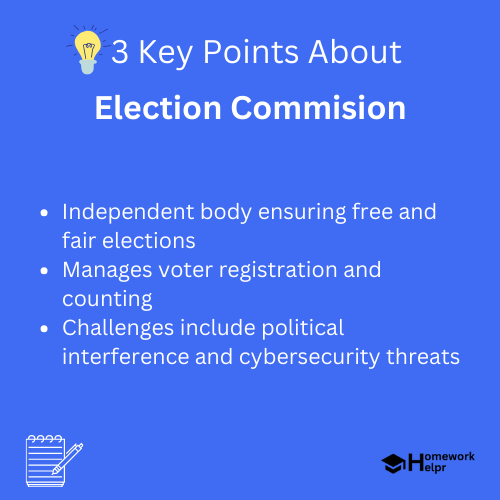📝 Summary
To ensure free and fair elections, the Election Commission plays a vital role in democratic societies. This independent body is responsible for overseeing the entire electoral process, which includes voter registration, conducting elections, monitoring campaigns, and declaring results. With a structure that varies across countries, it generally consists of a chief election commissioner and various election commissioners. Despite facing challenges such as political interference, cybersecurity threats, and voter apathy, the commission remains crucial for maintaining the integrity of the democratic system and ensuring citizens’ rights to vote are protected.
Understanding the Election Commission
The Election Commission plays a crucial role in a democratic society. It is an independent body that oversees and ensures free and fair elections. This includes everything from registration of voters to the counting of votes after the election. By managing the electoral process, the Election Commission helps maintain the integrity of the democratic system.
What is the Election Commission?
The Election Commission is a national body responsible for administering the election process. Its main duties include supervising elections, ensuring fair play, and protecting the rights of voters. Generally, every democratic country has its own version of an election commission, which operates independently of the government. This independence is critical, as it helps to avoid any potential manipulation of the electoral process.
Definition
Democratic Society: A society in which the government is elected by the people and is accountable to them. Integrity: The quality of being honest and having strong moral principles.
Structure of the Election Commission
The structure of the Election Commission varies from country to country, but generally, it is comprised of a group of commissioners who are appointed for fixed terms. For example, in India, the Election Commission consists of a chief election commissioner and two election commissioners. These individuals are responsible for making important decisions and ensuring that elections are conducted correctly.
- Chief Election Commissioner: The head of the commission, responsible for ensuring all electoral activities are executed smoothly.
- Election Commissioners: Assist the chief commissioner in various tasks and can take up specific responsibilities.
- Supporting Staff: Includes additional personnel who help manage logistics, technology, and communication during elections.
Functions of the Election Commission
The Election Commission has several critical functions, and these include:
- Voter Registration: Ensuring that all eligible citizens are registered to vote.
- Conducting Elections: Organizing elections in a streamlined manner, from polling to counting.
- Monitoring Campaigns: Observing election campaigns to prevent any unfair practices or violations.
- Declaring Results: Officially announcing the outcome of elections after all votes have been counted.
❓Did You Know?
Did you know that the first Election Commission was established in the United States in 1789? It was created to oversee the very first presidential election!
Challenges Faced by the Election Commission
Even though the Election Commission is vital for democracy, it faces several challenges:
- Political Interference: Sometimes, political parties may attempt to influence the electoral process.
- Cybersecurity Threats: With technology playing a crucial role in elections, protecting against cyber attacks has become a significant concern.
- Voter Apathy: Many eligible voters fail to participate in elections, which can undermine the democratic process.
The Importance of a Fair Electoral Process
A fair electoral process is essential for multiple reasons:
- Legitimacy: Elections provide the government with legitimacy, showing that the people approve of their leaders.
- Accountability: Elected officials are held accountable to the voters who put them in office.
- Representation: Elections ensure that diverse views and interests within the society are represented in governance.
The Role of Technology in Elections
In recent years, technology has transformed how elections are conducted. Computers, automated voting machines, and online voter registration have made the process more efficient. However, technology also brings challenges, such as the need for high cybersecurity measures to prevent hacking and misinformation.

Definition
Cybersecurity: The practice of protecting systems, networks, and programs from digital attacks.
Examples of Election Commission Practices
Examples
One example of effective voter registration is the Dutch system, where citizens are automatically registered when they reach voting age. This reduces the chances of voter apathy as citizens are already on the voter list before elections.
Examples
In the United States, election observers monitor polling places to ensure compliance with election laws. These individuals help maintain transparency and uphold the election’s integrity.
Conclusion
Understanding the role of the Election Commission is essential for appreciating how our democratic system works. The commission not only oversees elections but also ensures that every citizen’s right to vote is protected. By working independently and efficiently, the Election Commission plays a vital role in ensuring that governments reflect the will of the people.
Every eligible citizen must take part in the electoral process, as it is their right and responsibility. With continued improvements in technology and processes, the future of elections looks promising, provided we uphold democratic principles and integrity in the electoral process.
Related Questions on Election Commision
What is the main role of the Election Commission?
Answer: To oversee free and fair elections
How is the Election Commission structured?
Answer: It consists of commissioners appointed for fixed terms
What challenges does the Election Commission face?
Answer: Political interference, cybersecurity threats, voter apathy
Why is a fair electoral process important?
Answer: It legitimizes the government and ensures representation
